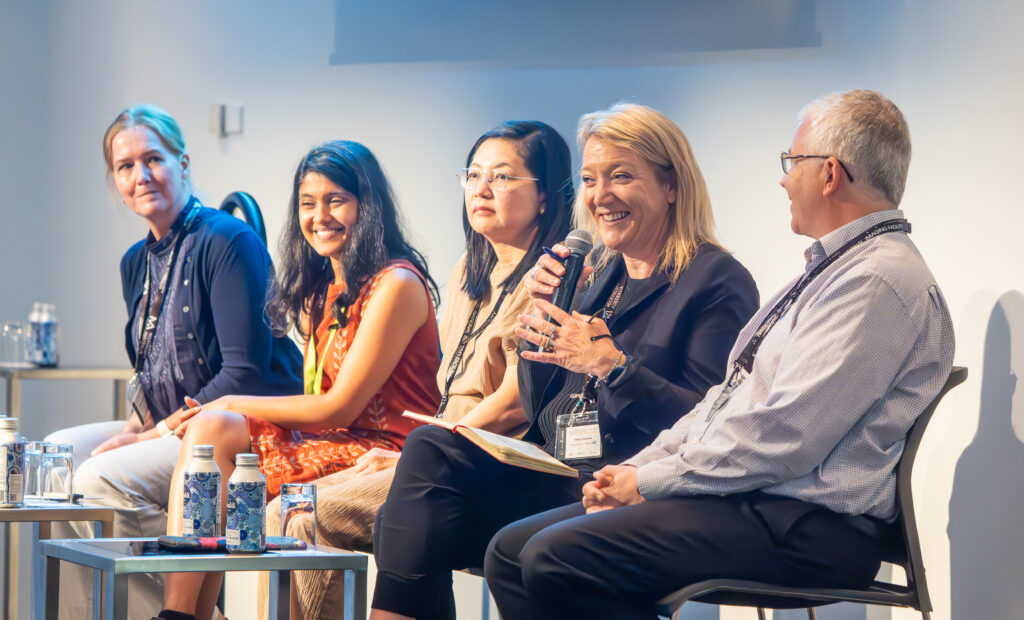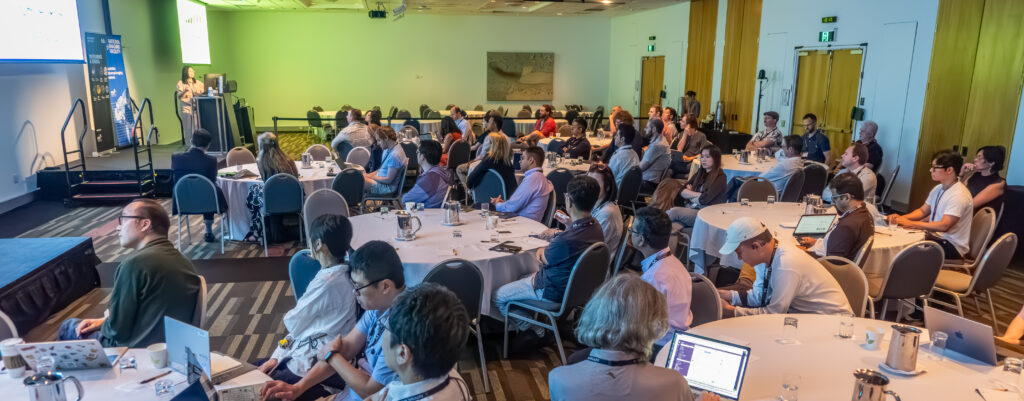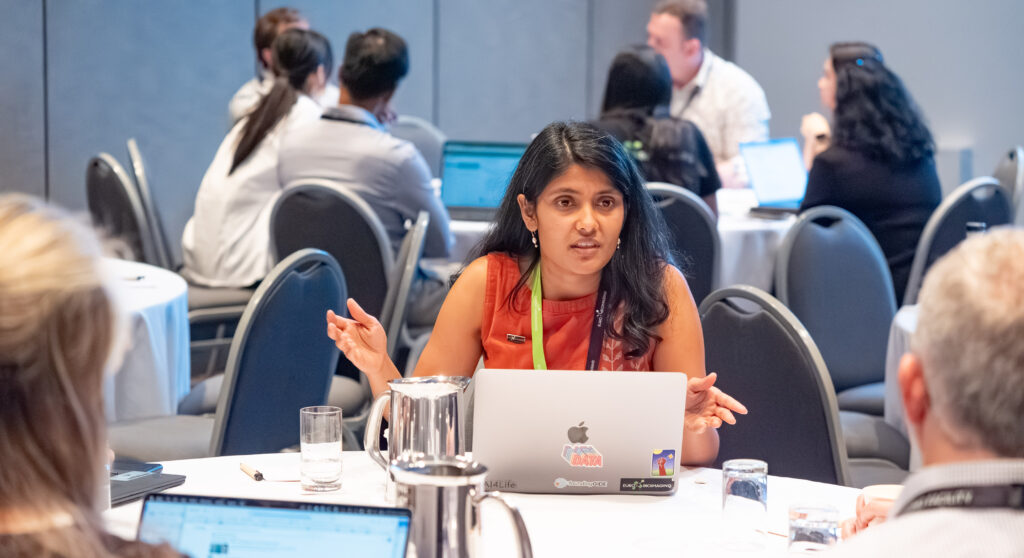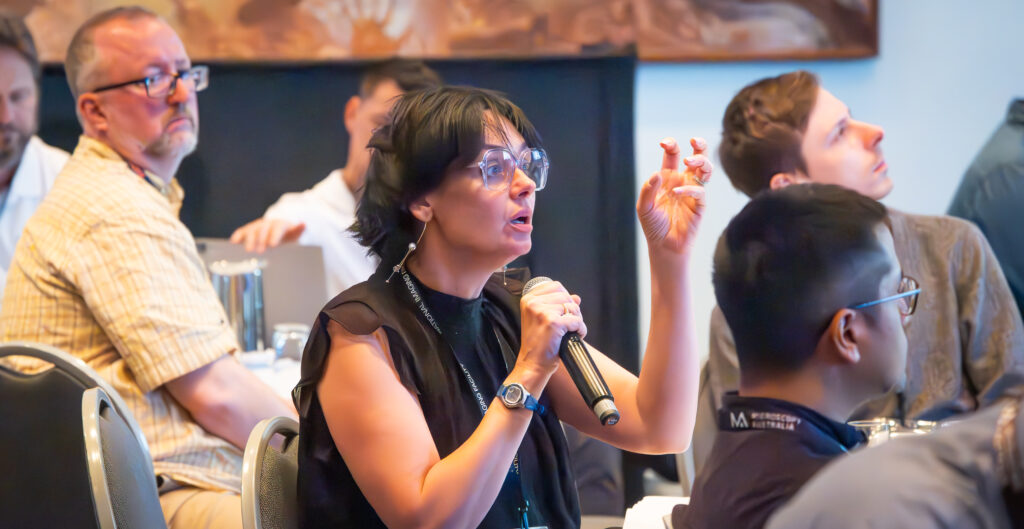The 2025 foundingGIDE Community Event held in Brisbane, Australia, concluded on a high note, having brought together researchers and research infrastructure providers from 30 country registrations for discussion, collaboration and innovation.
The event provided an opportunity for feedback on emerging image data standards for a Global Imaging Data Ecosystem (GIDE) and to maximise their relevance.
This year’s theme of ‘Imaging Data Ecosystem: Towards Shared Solutions’ generated lively discussions that were practical, focused and forward-looking, covering metadata harmonisation to emerging imaging technologies and AI, and much more.
Here we explore key insights from the event organisers, now that the dust has settled on the Community Event.

Why come together when online meetings are ubiquitous?
Aastha Mathur (Head of Image Data Services, Euro-BioImaging) explains why, in these days of easy sharing and online communication, it is important that people came together for this event.
“Imaging technologies are rapidly developing, so imaging data is getting bigger and more complex than ever before. This also leads to difficulty in maintaining standards to store and share image data,” she said.
Instead, it needs to be widely accessible, understandable, used and re-used.
Aastha shared that community events like this are an “important way to keep up with this evolving landscape” to find solutions that can be commonly and widely adopted.
“This helps us understand the needs of the community, build trust and consensus, and enable easy adoption of the community standards,” she said.
Aastha also emphasised that the Brisbane event aimed to draw attendees from a diverse mix of data communities, such as Research Data Alliance and Australian BioCommons, to learn from their efforts and assist with making imaging data more interoperable with other data types.

What are the success factors for community-led solutions?
Rishma Vidyasagar (Senior Manager, Advanced Human Imaging, NIF) reflected on the panel discussion about driving success in these kinds of community-led solutions, explaining that each panelist identified a different aspect that was of key importance to success, such as community, culture, infrastructure and policy.
“While policy was identified as important,” she said that people “recognised that expertise is not easily accessible to the foundingGide community.” Rish believes that this kind of support can come through shared conversations with government and peak body policymakers.
Rish was inspired by UQ’s Joe Shapter’s vision in his talk ‘What do we need to make the best use of our imaging data?’ where someone could “just hit a key at the scanner and it goes to a place that is easily accessible by anyone needing that data.”
Sarah Flaim (COO, NIF) also emphasised that the success of these shared imaging data solutions rely heavily on “a skilled, connected workforce of data stewards, imaging scientists, and infrastructure specialists who understand both the science and the standards.”
“Clear roles, targeted training, and collaboration across teams will help turn good ideas into lasting practice,” she said.

What was the feedback from the sessions and networking?
“From before the first session, right to the end, there was a wonderful spirit of discussion and possibility for the future of GIDE,” said Lisa Yen (CEO, Microscopy Australia).
Aligned with this spirit, Sara Motamen (Scientific Project Manager, NIF) shared that the feedback from attendees about the plenaries and workshops was indeed very positive: “Many people found the sessions highly engaging and valuable, with several noting that the workshop discussions were particularly productive.”
Importantly, she said, there is strong enthusiasm to continue these conversations beyond the event, which will help shape the next steps for the GIDE community and imaging researchers more broadly.
Wojtek Goscinski (CEO, NIF), was very pleased about feedback about the “excellent line-up of speakers that achieved a great balance of international and Australian experts across microscopy, biomedical imaging, and complementary communities.”
He congratulated the attendees and organising committees for their hard work and collaboration that made the event such a success.

What’s next for foundingGIDE?
Peter Bugeia (Senior Manager Data & Head of Digital Architecture, NIF) looks back at how the event advances the aims of foundingGIDE, reflecting that engaging with the international imaging data community is critical to developing a GIDE.
This event was the second foundingGIDE community event in a series of three (previously in Okazaki, Japan, and next in Heidelberg, Germany). “It is pivotal for establishing and consolidating imaging community connections and engagements first made in Okazaki,” Peter said.
“The event is designed as a big workshop to enable the flow of ideas and encourage discussion on what the ecosystem could be comprised of and how to build it,” Peter said. “It focuses emerging technologies in image data management and AI that can support the ecosystem – particularly in relation to what the Australian community has to offer.”
Wrapping up, Aastha mentioned how valuable the input from different communities and domains was, giving momentum to the coming months for “getting more ‘concrete’ on how we can continue our activities towards a GIDE.”
Looking ahead, Maria Mirza (Scientific Project Manager, Euro-BioImaging) on behalf of foundingGIDE, invites the global imaging data community to join the third community event in the series, taking place 4–8 May 2026 at EMBL in Heidelberg, Germany. This event will build on the collaborative spirit of Okazaki and Brisbane, bringing together researchers, technologists, policymakers and infrastructure experts to advance the shared vision of an interoperable GIDE. Express your interest to be part of this milestone here.
- You can see Day 1’s event images here.

The organising committee, hosts and partners thank project partners Global BioImaging Euro-BioImaging National Imaging Facility Microscopy Australia RIKEN German BioImaging – Gesellschaft für Mikroskopie und Bildanalyse e.V. European Bioinformatics Institute | EMBL-EBI Consiglio Nazionale delle Ricerche;
our silver sponsors AARNet and QCIF Digital Research, and bronze sponsor Intersect;
and organising committee members and planners National Imaging Facility Central team, Aastha Mathur, David Poger, Heidi Sutton, Helen Spindler, Ingrid Chan, Lisa Yen, Maria Mirza, PhD, Peter Bugeia, Rishma Vidyasagar, Sudeep Das, Sara Motamen, Wojtek James Goscinski, among others.